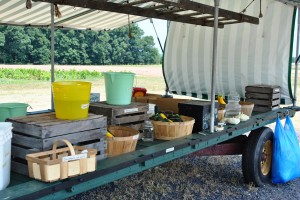Just Leave Your Cash in the Box

There are certain things that let you know you have crossed the line from the rest of the world to the East End of Long Island. Open spaces, chickens wandering on residential front lawns, tractors riding on main roads, different species of road kill. But one presence on the East End that still fascinates me is the honesty box. If you’ve never encountered one of these provincial gems, an honesty box is an unmanned stand that has produce, flowers, firewood or other items available for sale. [expand]
These boxes rely solely on the honor system, requiring customers to be completely self sufficient during the buying process, from selecting their purchase and adding up the cost properly to “honestly,” putting the correct total in a container that is usually fastened to the structure.
Sometimes these stands are set out at the front of a homeowner’s property; other times they are simply set up on a vacant parcel on the side of the road. Eerily, there is no one there to direct your acquisition. You are on your own to check prices, determine what a nondescript vegetable might indeed be, locate bags, etc. It is a very strange concept and the first time you do business with one of these entities you get a sense that something is just not right. You feel you are being watched, and quite frankly in this day and age, you may be.
My first encounter with an honesty box happened years ago (okay, many years ago) when I was a ‘tween. We spent our summers out here, so my indigenous roots were from Queens. The culture there, obviously, was quite different from the rural, carefree sentiment of the “country,” as we called it. Some friends and I had wandered down the main road that August afternoon, not particularly looking for mischief but open to any suggestions. We came upon a wooden cart laden with decorative bottles of honey. They came in all shapes and sizes and one that caught my eye was shaped like a teddy bear. It took us a few minutes to realize that these bottles were there for the taking. The bottles had price tags, and next to them was a little chest with a slit in the top, apparently for money. But the temptation was overwhelming, and we each helped ourselves to the bottle of our choice and skipped away.
We were ecstatic and arrived home with our treasures proud as peacocks. My triumph was short lived, however, and after an unsuccessful plea to my mother I was dragged back to the stand with a handful of change.
Stopping and buying from one of these stands is a liberating experience. Though you may be intimidated at first, once you make your first purchase you’ll understand the ins and outs of the honesty-box process. It does require some concentration and basic math skills, and some negotiating skills would come in handy as well. I frequent a particular honesty box (I cannot mention any names for fear I will incriminate myself) and feel I have developed a special relationship with it. There are times I am short a few coins, and there are times I do not have change and have to overpay. So we have a give-and-take deal going on that’s just between me and the box.
But you can also get caught up in a produce-picking frenzy and load up several bags with all kinds of beautiful peaches, plums, peppers and tomatoes. You are keeping a running mental tab but as the bags overflow and grow in number you become dazed and confused. Now the total becomes sketchy and you also have no spare change. Usually by now you start mumbling to yourself and look around, especially if there are other patrons alongside. After several attempts to reevaluate and recount to no avail, simply rounding off in their favor is your best bet.
These days I am in awe that anything in this society could exist on trust. It is amazing to see these honesty boxes dotted along North and South Fork roads everywhere. I try and buy from these unassuming roadside carts whenever I can, partly because, like all local farm stands, their offerings are usually superior to those in supermarkets. Also, I want to support these symbols of bucolic innocence in the hopes they will persevere. They are an important part of our East End culture, and are vulnerable enough to become a dying breed amidst a growing and changing population. [/expand]



